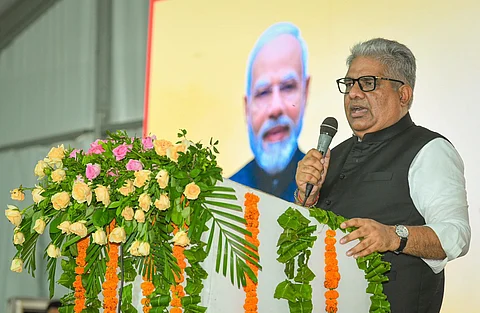

The International Court of Justice's advisory ruling on climate change, labeling government actions as 'illegal', presents a complex scenario for India.
While it pressures developed nations, India, a major emitter, faces increased scrutiny and accountability.
Experts suggest this could impact India's fossil fuel policies and climate negotiations, especially at the upcoming UNFCCC Conference of Parties.
The landmark advisory ruling of the International Court of Justice (ICJ), the United Nations judicial body, termed government actions driving climate change as ‘illegal’ and also held them legally responsible for releasing toxic emissions, a verdict that may prove to be a mixed bag for India, according to climate experts.
“For countries like India, which is highly vulnerable to devastating climate impacts like extreme heat waves, floods, droughts, and sea level rise affecting millions, this is a monumental step towards securing much-needed climate justice and holding historical polluters to account,” stated Harjeet Singh, climate activist and founding director of Satat Sampada Climate Foundation. India is incidentally one of the most highly climate impacted countries, in terms of mortality as well as financial losses.
Experts agreed that the latest promulgation would put pressure on developed countries, who are high emitters. However, they added that part of the pressure may actually bounce back on India, which ranks third globally on gross carbon emissions, during future climate negotiations particularly at the 30th Conference of Parties to the United Nations Framework Convention on Climate Change (UNFCCC) in Belem.
“The ICJ’s advisory opinion has significant implications for India. As a major emerging economy and one of the top emitters, India now faces greater international legal and moral pressure to accelerate its fossil fuel phase-down,” pointed out Anjal Prakash, a climate scientist at the Indian School of Business and an author of the Intergovernmental Panel on Climate Change report.
“The opinion strengthens the expectation that all states must align their actions with climate science and human rights obligations. For India, it means clearer accountability on coal dependence, emissions targets, and fossil fuel subsidies. This could also impact future litigation and climate-related trade negotiations,” added Prakash.
Coal still forms the core of India’s energy mix despite the rise in solar power strength, a factor that has repeatedly invited criticism for the country during global negotiations. Incidentally India and China, forced the replacement of the expression ‘phase out of coal’ to ‘phase down of coal’ during the final negotiations at UNFCCC COP 26 in Glasgow.
Singh also observed that the advisory ruling text may put India into a spot of bother during future negotiations. “If observed closely, one can find that while there is no change to the core UNFCCC principle of common but differentiated responsibilities and respective capabilities, the court has added nuance to the principle by recognising that the status of a state as either developed or developing is not static.” As a consequence, India’s developing economy status may come under the scanner.
Incidentally India, which remained tight-lipped on the latest climate ruling of the ICJ, has focused on the principle of maintaining ‘common but differentiated responsibilities and respective capabilities’ in its submissions to the Court on climate change, while also advocating for climate justice and highlighting the disproportionate impact of climate change on developing nations.
India, in both written and oral submissions, emphasises on the need for developed nations “to fulfil their climate finance commitments and support developing countries in undertaking climate action”.
“The advisory opinion changes the focus from the narrow confines of the carbon-centric approach, which was the basis of most climate-related talks, to the larger issue of protection of climate systems which is defined as the totality of the atmosphere,” explained environment lawyer Ritwick Dutta on July 25. Dutta pointed out that along with drivers of climate change, environmental issues like pollution, river health and biodiversity would have to be considered under the ambit of the climate system according to the ICJ order.
“The narrow focus on climate led to judicial decisions in India such as the one on the Great Indian Bustard, where the Supreme Court highlighted the need to promote renewable energy to meet climate goals but undermined biodiversity conservation,” added Dutta.